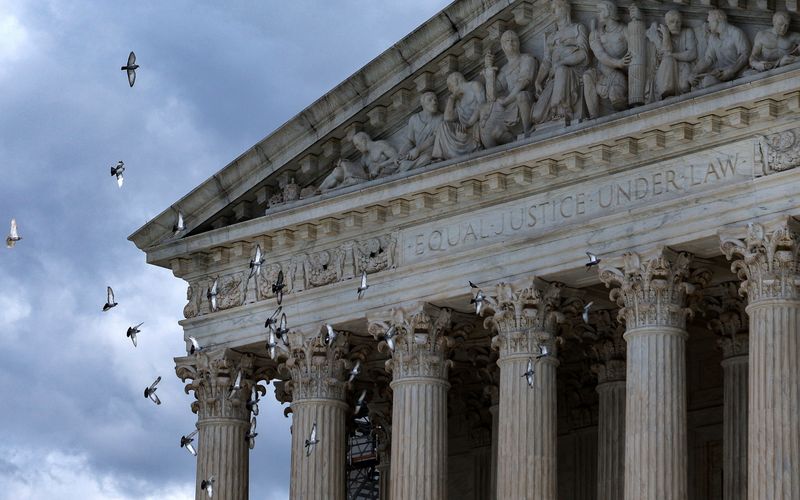By Andrew Chung
(Reuters) - The U.S. Supreme Court is preparing to begin its new nine-month term on Monday with the public focused not only on the big cases due to be decided but also on the ethics standards of the justices themselves.
The court, lacking a binding ethics code, has been buffeted for months by revelations involving some of the nine justices concerning hobnobbing with the rich and powerful - private jets, luxury vacations, real estate deals and more.
These revelations have raised questions over whether Justices Clarence Thomas and Samuel Alito, part of the court's 6-3 conservative majority, will recuse themselves from participating in two pending cases based on their personal ties to parties involved in the litigation.
The ethics concerns are not going away, according to legal experts, even as the court in its new term takes up cases that could further expand gun rights and curtail the regulatory authority of federal agencies.
"The usual inquiry at the beginning of a term is, 'What are the big cases and how is the court likely to rule on those cases?'" retired federal judge Jeremy Fogel, who heads the Berkeley Judicial Institute at the University of California, Berkeley School of Law, said in an interview. "But the question about the court's administration of its own business - I don't remember ever seeing that at the beginning of a term."
The ethics drumbeat has added pressure to a court already facing declining public approval following major rulings in its past two terms powered by its conservative majority. The court ended its recognition of a constitutional right to abortion, expanded gun rights and rejected affirmative action collegiate admissions policies often used to increase Black and Hispanic student enrollment.
An August Reuters/Ipsos poll found that just 39% of U.S. adults surveyed held a positive view of the court, down from 52% in a June 2022 poll conducted just before the abortion decision.
Some conservatives view the ethics narrative involving the court as cooked up by liberals upset at its rightward leanings.
"I'm sure that it is to some degree hanging like an albatross over the heads, certainly, of Clarence Thomas and Samuel Alito," John Malcolm, a legal scholar at the conservative Heritage Foundation think tank, said of the ethics issue.
"I believe it is the most concerted effort by the left to question the impartiality of and attack the integrity of the court," Malcolm said. "I think it's shameful."
RECUSAL QUESTIONS
The news outlet ProPublica has detailed luxury trips taken for years by Thomas provided by Texas businessman Harlan Crow as well as real estate transactions involving the justice and the billionaire Republican donor.
ProPublica last week also reported that the conservative Koch network of political donors, which has had multiple cases before the court, has brought Thomas in recent years to its summit meetings.
Koch network attorneys represent the plaintiffs in a major case set to be argued this term that could undercut the regulatory power of federal agencies. The plaintiffs in the case are asking the court to overturn its decades-old precedent - long opposed by the Koch network - that calls for judges to defer to federal agency interpretation of U.S. laws, a doctrine called " Chevron (NYSE:CVX) deference."
ProPublica also has detailed a 2008 flight Alito took on a private jet provided by billionaire hedge fund founder Paul Singer for a luxury fishing trip in Alaska. Alito publicly defended himself, saying he has "no obligation" to recuse in any case connected to Singer.
The justices soon will decide on whether to hear a bankruptcy-related case involving Singer's Elliott Investment Management, which is urging them to turn away U.S. Bancorp's appeal of a court-approved restructuring of telecommunications company Windstream.
Supreme Court justices decide for themselves whether to disqualify themselves from cases due to a conflict of interest.
Thomas, Alito and lawyers involved in the two cases did not respond to requests for comment.
Other media reports have detailed a real estate transaction involving conservative Justice Neil Gorsuch and the chief executive of a major law firm as well as aides promoting sales of books by liberal Justice Sonia Sotomayor in conjunction with her public speaking events.
The lack of formal ethics rules for the justices - on recusals and beyond - fosters lingering questions about their fairness and impartiality, according to some legal experts.

"I don't think there's any principled reason why the justices of the Supreme Court should not be held to the same types of regulations as other federal judges," University of Chicago Law School Professor Geoffrey Stone told a recent panel discussion in Chicago.
The lack of an ethics code, Fogel added, "will continue to fuel doubts, fairly or unfairly, about the court's integrity."